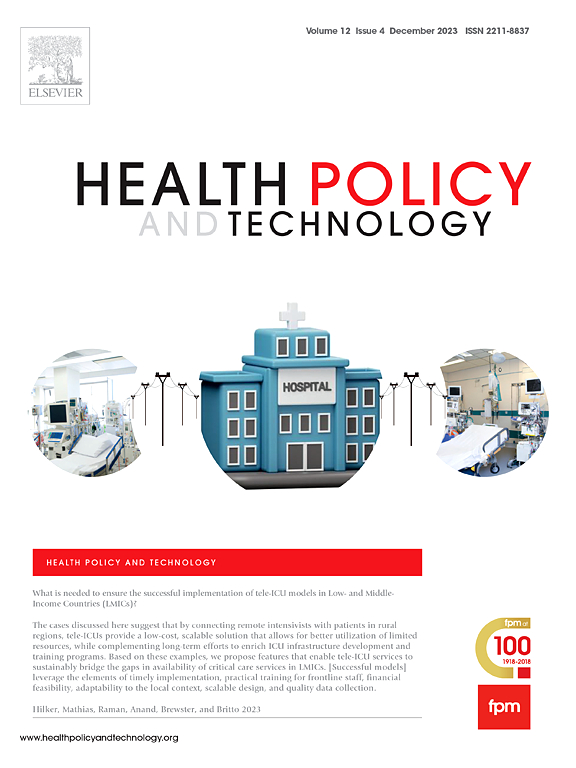Non-clinical direct-to-consumer genetic testing: a scoping review of regulatory frameworks and issues
IF 3.7
3区 医学
Q1 HEALTH POLICY & SERVICES
引用次数: 0
Abstract
Introduction
Direct-to-Consumer Genetic Testing (DTC-GT) provides consumers access to genetic tests without the mediation of healthcare professionals. This raises regulatory and ethical concerns including potential misinformation from company claims, especially in Singapore where DTC-GT is limited to non-clinical applications and is presently not regulated under health products regulations.
Objective
This scoping review aims to map non-clinical DTC-GT regulatory guidelines and compare data protection laws for genetic data to understand the regulatory landscape.
Methods
Online databases (PubMed, EBSCO, Springer, ScienceDirect, Embase, Web of Science, and SCOPUS) were used to identify papers published from 2000 onwards along with grey literature like websites and reports from Google searches.
Results
Based on the scoping review, 35 publications were identified, comprising 19 regulations and guidelines, and 16 relevant articles. Our findings indicate that the regulatory landscape of DTC-GT lacks uniformity, with most jurisdictions without specific regulations for non-clinical DTC-GT. 7 jurisdictions were identified to have data protection laws concerning genetic data privacy.
Conclusions
The review concluded that non-clinical DTC-GT is generally perceived as low-risk, resulting in minimal regulatory scrutiny across the surveyed regions. Despite the fundamental roles of informed consent and anonymisation of genetic data within existing frameworks for genetic data privacy, the regulation of non-clinical DTC-GT remains either limited or entirely absent due to its low-risk classification. Consequently, there is a significant need to enhance consumer health literacy, ensuring individuals are well-informed about GT services and are aware of the limitations and implications of data privacy risks. This approach is essential for safeguarding consumer interests in the evolving genetic testing landscape, as accuracy and reliability of these tests can be questionable, often leading to misinformation.
Public Interest Summary
This scoping review highlights that non-clinical DTC-GT often have minimal regulations because they are seen as low risk. However, the lack of specific regulations for how genetic data is collected, used, and shared poses privacy concerns. As genetic research technology advances, regulations should be adaptable and based on fundamental principles to keep up with these changes. It is also crucial to protect individuals from discrimination based on their genetic information. While there is no urgent need to regulate non-clinical DTC-GT that do not impact medical diagnoses, there is a growing concern about companies suggesting these tests have clinical importance without clear evidence. The best way forward is to implement strong consumer education programmes to help people understand the risks and benefits of non-clinical DTC-GT, ensuring they can make informed choices.
非临床直接面向消费者的基因检测:监管框架和问题的范围审查
直接面向消费者的基因检测(DTC-GT)为消费者提供了无需医疗保健专业人员调解的基因检测途径。这引起了监管和道德方面的担忧,包括公司声明中可能存在的错误信息,特别是在新加坡,DTC-GT仅限于非临床应用,目前不受健康产品法规的监管。目的:本综述旨在绘制非临床DTC-GT监管指南,并比较遗传数据的数据保护法律,以了解监管格局。方法利用在线数据库(PubMed、EBSCO、谷歌、ScienceDirect、Embase、Web of Science和SCOPUS)识别2000年以来发表的论文以及谷歌搜索的网站和报告等灰色文献。结果根据范围审查,确定了35篇出版物,包括19篇法规和指南以及16篇相关文章。我们的研究结果表明,DTC-GT的监管格局缺乏统一性,大多数司法管辖区没有针对非临床DTC-GT的具体法规。确定有7个司法管辖区制定了有关遗传数据隐私的数据保护法。该综述的结论是,非临床DTC-GT通常被认为是低风险的,因此在调查地区的监管审查很少。尽管知情同意和遗传数据匿名化在现有遗传数据隐私框架中发挥着重要作用,但由于其低风险分类,对非临床DTC-GT的监管仍然有限或完全缺失。因此,非常需要提高消费者的健康知识,确保个人充分了解GT服务,并意识到数据隐私风险的局限性和影响。这种方法对于在不断发展的基因检测领域维护消费者利益至关重要,因为这些检测的准确性和可靠性可能受到质疑,经常导致错误信息。该范围审查强调,非临床DTC-GT通常具有最小的法规,因为它们被视为低风险。然而,缺乏关于如何收集、使用和共享基因数据的具体规定,引发了隐私问题。随着基因研究技术的进步,法规应该具有适应性,并以基本原则为基础,以跟上这些变化。保护个人免受基于其遗传信息的歧视也至关重要。虽然没有迫切需要对不影响医学诊断的非临床DTC-GT进行监管,但越来越多的公司在没有明确证据的情况下暗示这些测试具有临床重要性。最好的方法是实施强有力的消费者教育计划,帮助人们了解非临床DTC-GT的风险和益处,确保他们能够做出明智的选择。
本文章由计算机程序翻译,如有差异,请以英文原文为准。
求助全文
约1分钟内获得全文
求助全文
来源期刊

Health Policy and Technology
Medicine-Health Policy
CiteScore
9.20
自引率
3.30%
发文量
78
审稿时长
88 days
期刊介绍:
Health Policy and Technology (HPT), is the official journal of the Fellowship of Postgraduate Medicine (FPM), a cross-disciplinary journal, which focuses on past, present and future health policy and the role of technology in clinical and non-clinical national and international health environments.
HPT provides a further excellent way for the FPM to continue to make important national and international contributions to development of policy and practice within medicine and related disciplines. The aim of HPT is to publish relevant, timely and accessible articles and commentaries to support policy-makers, health professionals, health technology providers, patient groups and academia interested in health policy and technology.
Topics covered by HPT will include:
- Health technology, including drug discovery, diagnostics, medicines, devices, therapeutic delivery and eHealth systems
- Cross-national comparisons on health policy using evidence-based approaches
- National studies on health policy to determine the outcomes of technology-driven initiatives
- Cross-border eHealth including health tourism
- The digital divide in mobility, access and affordability of healthcare
- Health technology assessment (HTA) methods and tools for evaluating the effectiveness of clinical and non-clinical health technologies
- Health and eHealth indicators and benchmarks (measure/metrics) for understanding the adoption and diffusion of health technologies
- Health and eHealth models and frameworks to support policy-makers and other stakeholders in decision-making
- Stakeholder engagement with health technologies (clinical and patient/citizen buy-in)
- Regulation and health economics
 求助内容:
求助内容: 应助结果提醒方式:
应助结果提醒方式:


